Shares in Asia retreated on Friday after a mixed day on Wall Street as optimism over signs that the US Federal Reserve might temper its aggressive interest rate hikes was replaced by worries that the economy might be headed for a recession.
A US measure of inflation that is closely watched by the Fed eased in October, raising questions over the central bank’s determination to keep raising interest rates to tame price increases.
In addition, activity in US manufacturing contracted last month for the first time since May 2020, the Institute for Supply Management said.
The report also showed that prices are falling.
Slower growth due to tighter monetary policies has slowed new orders and order backlogs, “which saw manufacturing conditions contracting for the first time since June 2020,” IG Asia Pte market strategist Yeap Jun Rong (葉俊榮) said in a report.
That might suggest that with “inflation risks behind us now, ‘bad news’ in economic data may not be ‘good news’ for markets, as recession fears could be brewing,” he said.
Signs of weakening trade, especially for export dependent economies in Asia, have deepened worries over slowing growth in China and its implications for the global economy.
In Taiwan, the TAIEX closed down 42.12 points, or 0.28 percent, at 14,970.68. Turnover totaled NT$223.099 billion (US$7.29 billion). The index gained 1.3 percent from a week earlier.
Tokyo’s Nikkei 225 dropped 1.59 percent to 27,777.9, down 1.79 percent on the week, while the broader TOPIX declined 1.64 percent to 1,953.98, losing 3.17 percent weekly.
Hong Kong’s Hang Seng fell 0.33 percent to 18,675.35, but posted a weekly gain of 6.27 percent, while the Shanghai Composite index lost 0.29 percent to 3,156.14, up 1.76 percent week-on-week.
South Korea’s KOSPI shed 1.84 percent to 2,434.33, dipping 0.14 percent from a week earlier.
Australia’s S&P/ASX 200 slipped 0.72 percent to 7,301.5, but increased 0.58 percent weekly, while India’s SENSEX dropped 0.66 percent to 62,868.5, up 0.92 percent from a week earlier.
The declines followed a 0.1 percent retreat in the US’ benchmark S&P 500, which closed at 4,076.57 on Thursday.
Additional reporting by staff writer, with CNA

Taiwan Transport and Storage Corp (TTS, 台灣通運倉儲) yesterday unveiled its first electric tractor unit — manufactured by Volvo Trucks — in a ceremony in Taipei, and said the unit would soon be used to transport cement produced by Taiwan Cement Corp (TCC, 台灣水泥). Both TTS and TCC belong to TCC International Holdings Ltd (台泥國際集團). With the electric tractor unit, the Taipei-based cement firm would become the first in Taiwan to use electric vehicles to transport construction materials. TTS chairman Koo Kung-yi (辜公怡), Volvo Trucks vice president of sales and marketing Johan Selven, TCC president Roman Cheng (程耀輝) and Taikoo Motors Group

Among the rows of vibrators, rubber torsos and leather harnesses at a Chinese sex toys exhibition in Shanghai this weekend, the beginnings of an artificial intelligence (AI)-driven shift in the industry quietly pulsed. China manufactures about 70 percent of the world’s sex toys, most of it the “hardware” on display at the fair — whether that be technicolor tentacled dildos or hyper-realistic personalized silicone dolls. Yet smart toys have been rising in popularity for some time. Many major European and US brands already offer tech-enhanced products that can enable long-distance love, monitor well-being and even bring people one step closer to

RECORD-BREAKING: TSMC’s net profit last quarter beat market expectations by expanding 8.9% and it was the best first-quarter profit in the chipmaker’s history Taiwan Semiconductor Manufacturing Co (TSMC, 台積電), which counts Nvidia Corp as a key customer, yesterday said that artificial intelligence (AI) server chip revenue is set to more than double this year from last year amid rising demand. The chipmaker expects the growth momentum to continue in the next five years with an annual compound growth rate of 50 percent, TSMC chief executive officer C.C. Wei (魏哲家) told investors yesterday. By 2028, AI chips’ contribution to revenue would climb to about 20 percent from a percentage in the low teens, Wei said. “Almost all the AI innovators are working with TSMC to address the

FUTURE PLANS: Although the electric vehicle market is getting more competitive, Hon Hai would stick to its goal of seizing a 5 percent share globally, Young Liu said Hon Hai Precision Industry Co (鴻海精密), a major iPhone assembler and supplier of artificial intelligence (AI) servers powered by Nvidia Corp’s chips, yesterday said it has introduced a rotating chief executive structure as part of the company’s efforts to cultivate future leaders and to enhance corporate governance. The 50-year-old contract electronics maker reported sizable revenue of NT$6.16 trillion (US$189.67 billion) last year. Hon Hai, also known as Foxconn Technology Group (富士康科技集團), has been under the control of one man almost since its inception. A rotating CEO system is a rarity among Taiwanese businesses. Hon Hai has given leaders of the company’s six